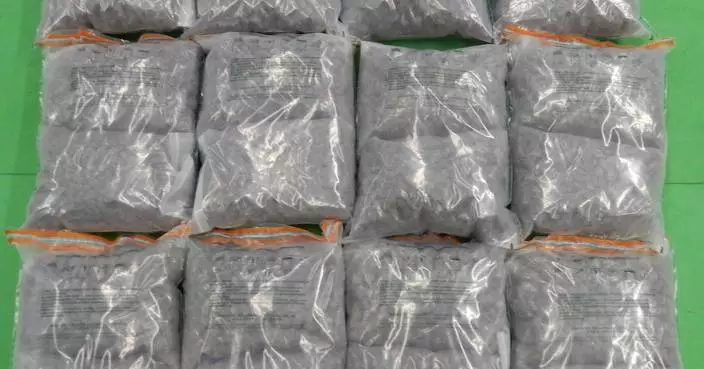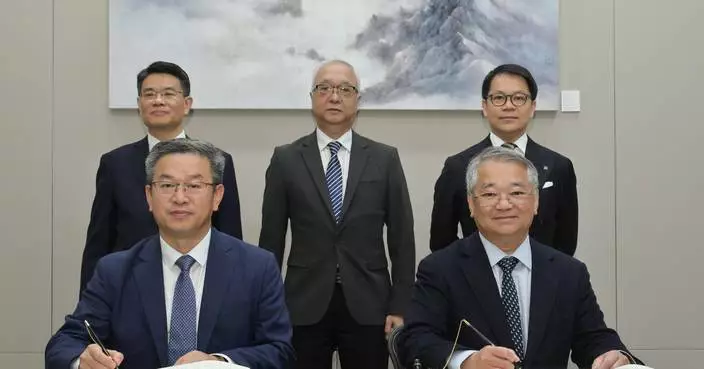DH announced the latest situation of Legionnaires' Disease cases and appealed to those who had joined a tour group to Foshan to contact DH
The Centre for Health Protection (CHP) of the Department of Health today (November 25) reported the latest number of cases of Legionnaires' disease (LD), and appealed to those who had participated in a tour group to Foshan organised by Travel Around Limited from November 7 to 9 to take the initiative to contact CHP.
From November 17 to 23, the CHP recorded three imported and one community-acquired LD cases.
Two imported cases had epidemiological linkage, involving two males aged 67 and 68 respectively who travelled to Foshan on a group tour organised by the Travel Around Limited (tour code: BG-EAL03) from November 7 to 9. They did not know each other before joining the tour. Following investigation, the CHP identified two further cases from the same tour yesterday (November 24) and today, involving two male patients aged 62 and 65. All four patients had underlying illness. Initial investigation revealed that they did not have common local movements except having joined the tour to Foshan during November 7 to 9. The CHP believed that they were infected during the trip. The CHP is actively contacting the other persons who were part of the tour group to follow up on their health conditions, and appealed to them to call the CHP's hotline (2125 2372) for follow up and medical surveillance. The hotline will be operating from 9am to 5pm from tomorrow (November 26) to November 29. They should seek medical advice immediately if they develop symptoms of infection, such as fever or feeling unwell.
The CHP has reported the case to the health authorities on the Mainland. Epidemiological investigations are still in progress.
Details of the remaining imported and community-acquired LD cases, which were not epidemiologically related to the above cluster, are as follow:
A male patient, aged 69 with underlying illnesses, who had been to the Mainland during the incubation period and was classified as an imported case; and
A male patient, aged 42 with underlying illnesses, who lives in Tsuen Wan District.
"Epidemiological investigations are ongoing to identify potential sources of infection, high-risk exposure and clusters, if any," a spokesman for the CHP said.
As of November 23, 115 LD cases had been recorded this year. In 2023 and 2022, there were 121 and 80 cases respectively.
"Men, people aged over 50, smokers, alcoholics and persons with weakened immunity are more susceptible to LD. Some situations may also increase the risk of infection, including poor maintenance of water systems; living in areas with old water systems, cooling towers or fountains; using electric water heaters, whirlpools and spas or hot water spring spas; and recent stays in hotels or vessels," the spokesman said.
Legionellae are found in various environmental settings and grow well in warm water (20 to 45 degrees Celsius). They can be found in aqueous environments such as water tanks, hot and cold water systems, cooling towers, whirlpools and spas, water fountains and home apparatus that support breathing. People may become infected when they breathe in contaminated droplets (aerosols) and mist generated by artificial water systems, or when handling garden soil, compost and potting mixes.
Immunocompromised persons should:
Use sterile or boiled water for drinking, tooth brushing and mouth rinsing;
Avoid using humidifiers, or other mist- or aerosol-generating devices; and
If using humidifiers, or other mist- or aerosol-generating devices, fill the water tank with only sterile or cooled freshly boiled water, and not water directly from the tap. Also, clean and maintain humidifiers/devices regularly according to manufacturers' instructions. Never leave stagnant water in a humidifier/device. Empty the water tank, wipe all surfaces dry, and change the water daily.
The public should observe the health advice below:
Observe personal hygiene;
Do not smoke and avoid alcohol consumption;
Strainers in water taps and shower heads should be inspected, cleaned, descaled and disinfected regularly or at a frequency recommended by the manufacturer;
If a fresh-water plumbing system is properly maintained, it is not necessary to install domestic water filters. Use of water filters is not encouraged as clogging occurs easily, which can promote growth of micro-organisms. In case water filters are used, the pore size should be 0.2 micrometres (µm) and the filter needs to be changed periodically according to the manufacturer's recommendations;
Drain and clean water tanks of buildings at least quarterly;
Drain or purge for at least one minute infrequently used water outlets (e.g. water taps, shower heads and hot water outlets) and stagnant points of the pipework weekly or before use;
Seek and follow doctors' professional advice regarding the use and maintenance of home respiratory devices and use only sterile water (not distilled or tap water) to clean and fill the reservoir. Clean and maintain the device regularly according to the manufacturer's instructions. After cleaning/disinfection, rinse the device with sterile water, cooled freshly boiled water or water filtered with 0.2 µm filters. Never leave stagnant water in the device. Empty the water tank, keep all surfaces dry, and change the water daily; and
When handling garden soil, compost and potting mixes:
Wear gloves and a face mask;
Water gardens and compost gently using low pressure;
Open composted potting mixes slowly and make sure the opening is directed away from the face;
Wet the soil to reduce dust when potting plants; and
Avoid working in poorly ventilated places such as enclosed greenhouses.
The public may visit the CHP'sLD page, theCode of Practice for Prevention of LDand theHousekeeping Guidelines for Cold and Hot Water Systems for Building Managementof the Prevention of LD Committee, and the CHP'srisk-based strategyfor prevention and control of LD.
LegCo Subcommittee on Matters Relating to the Development of Smart City visits Tseung Kwan O Hospital
The following is issued on behalf of the Legislative Council Secretariat:
The Legislative Council Subcommittee on Matters Relating to the Development of Smart City visited Tseung Kwan O Hospital (TKOH) today (November 25) to learn about the latest situation of the Hospital Authority (HA) in promoting the development of "Smart Hospital".
Members first received a briefing by representatives of TKOH on its "Smart Hospital" projects. Members noted that TKOH was one of three public hospitals designated by the HA for the development of a "Smart Hospital", which aimed to support administrative operations and clinical management of hospitals through the application of technologies such as big data analysis and artificial intelligence, thereby enhancing the quality and efficiency of healthcare services while ensuring patient safety.
Members then visited the specialist out-patient clinic, a ward and an operating theatre of the hospital to understand how the HA's mobile application "HA Go" provides personalised services to patients, as well as the application of 5G technology in operating theatres, including assisting senior doctors in remotely monitoring the progress of medical surgeries and providing guidance. Members also noted that the electronic vital signs system used in the hospital's "Smart Ward" was equipped with functions such as alerts on abnormal conditions, which, together with the electronic bed panel in the ward, would enable clinical staff to monitor the medical needs and conditions of the patients in a more effective manner.
Before concluding the visit, Members visited the "Smart Pharmacy" to learn about the paperless mode of operation of the pharmacy and the use of Internet of Things technologies and automated systems to enhance dispensing efficiency and accuracy. Members also exchanged views with representatives of the HA and the hospital regarding the challenges of further automation of services.
Members who participated in the visit were the Chairman of the Subcommittee on Matters Relating to the Development of Smart City, Ms Elizabeth Quat, Subcommittee members Mr Chan Siu-hung and Ms Carmen Kan.
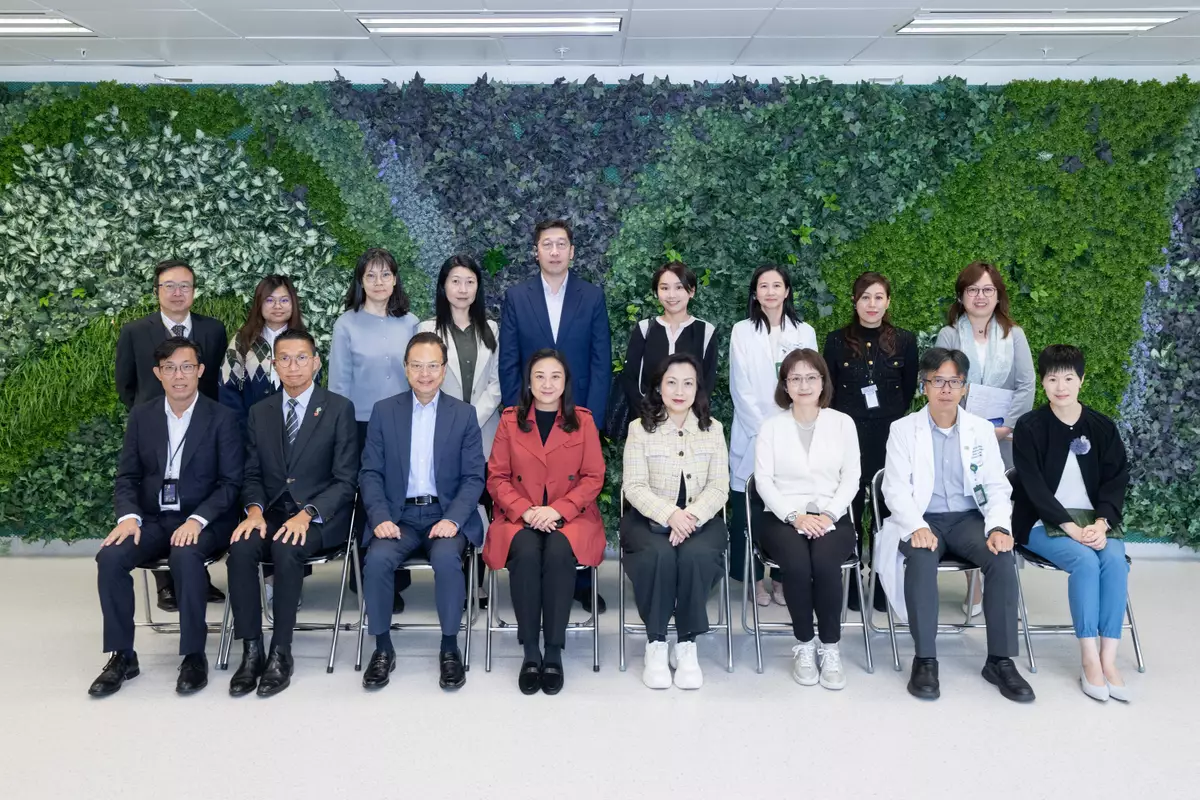
LegCo Subcommittee on Matters Relating to the Development of Smart City visits Tseung Kwan O Hospital Source: HKSAR Government Press Releases
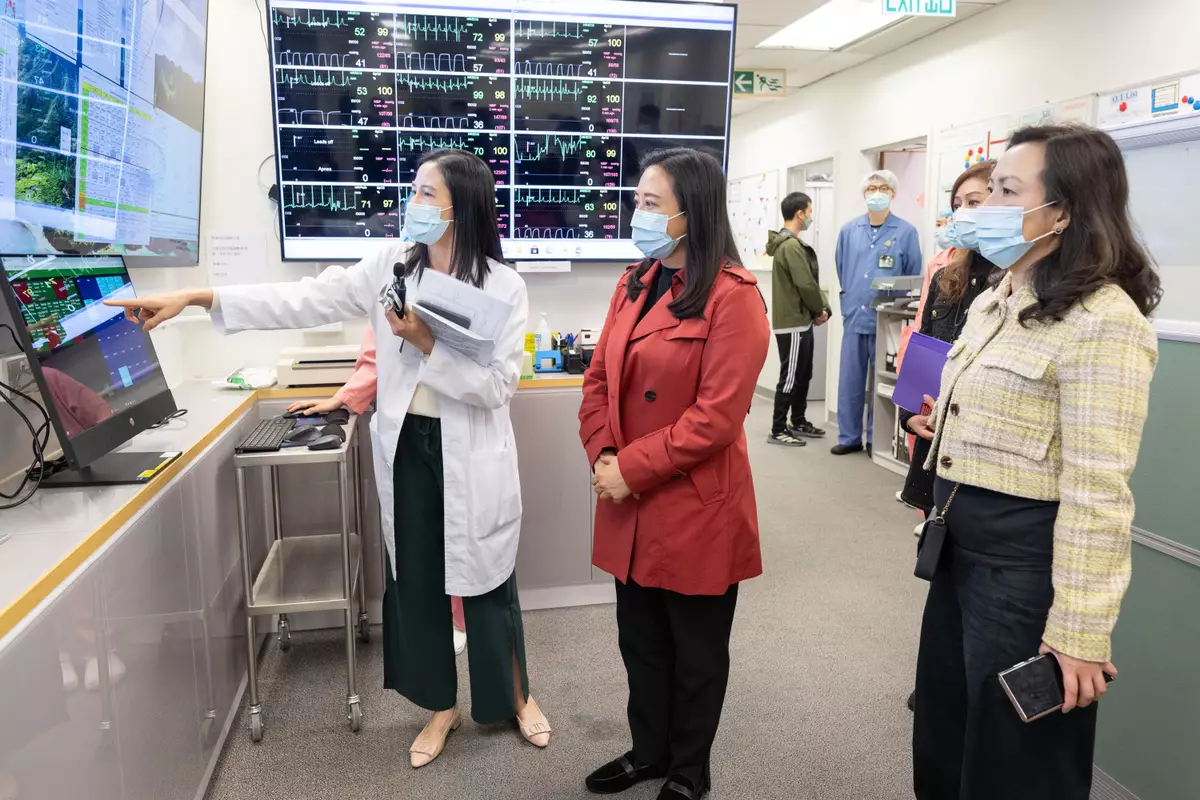
LegCo Subcommittee on Matters Relating to the Development of Smart City visits Tseung Kwan O Hospital Source: HKSAR Government Press Releases
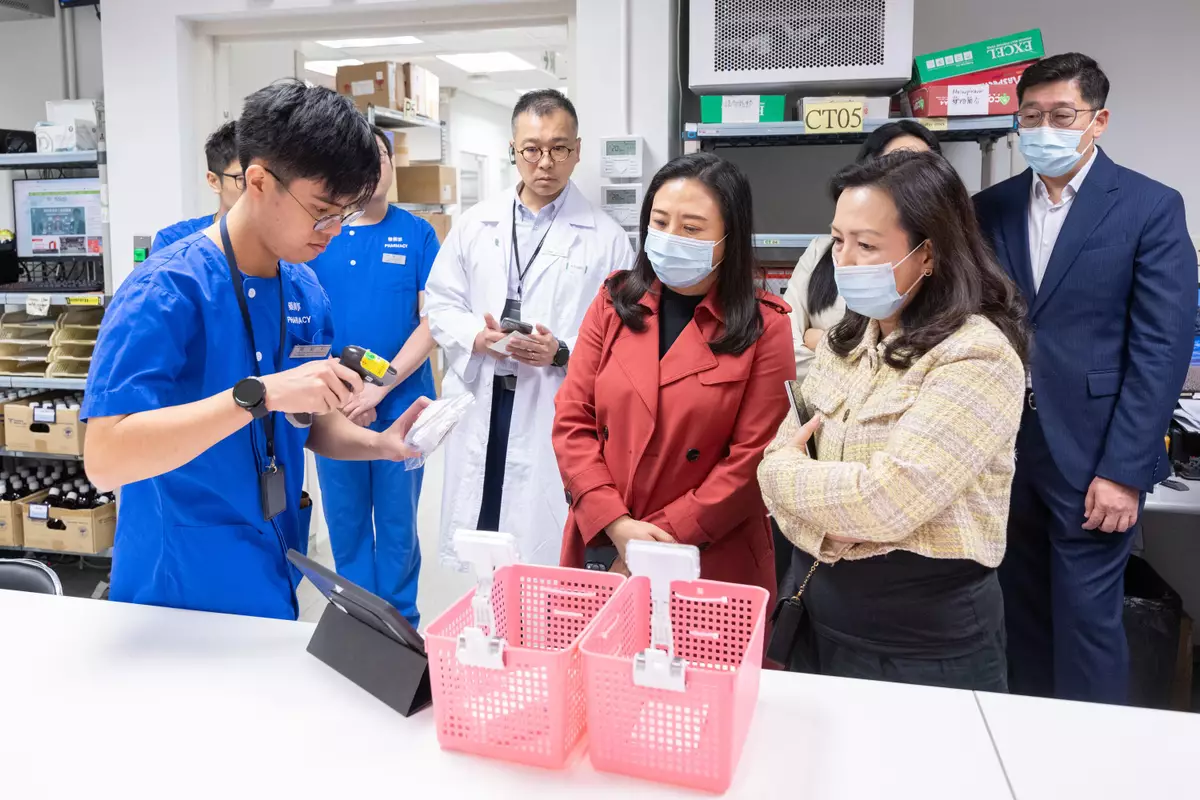
LegCo Subcommittee on Matters Relating to the Development of Smart City visits Tseung Kwan O Hospital Source: HKSAR Government Press Releases
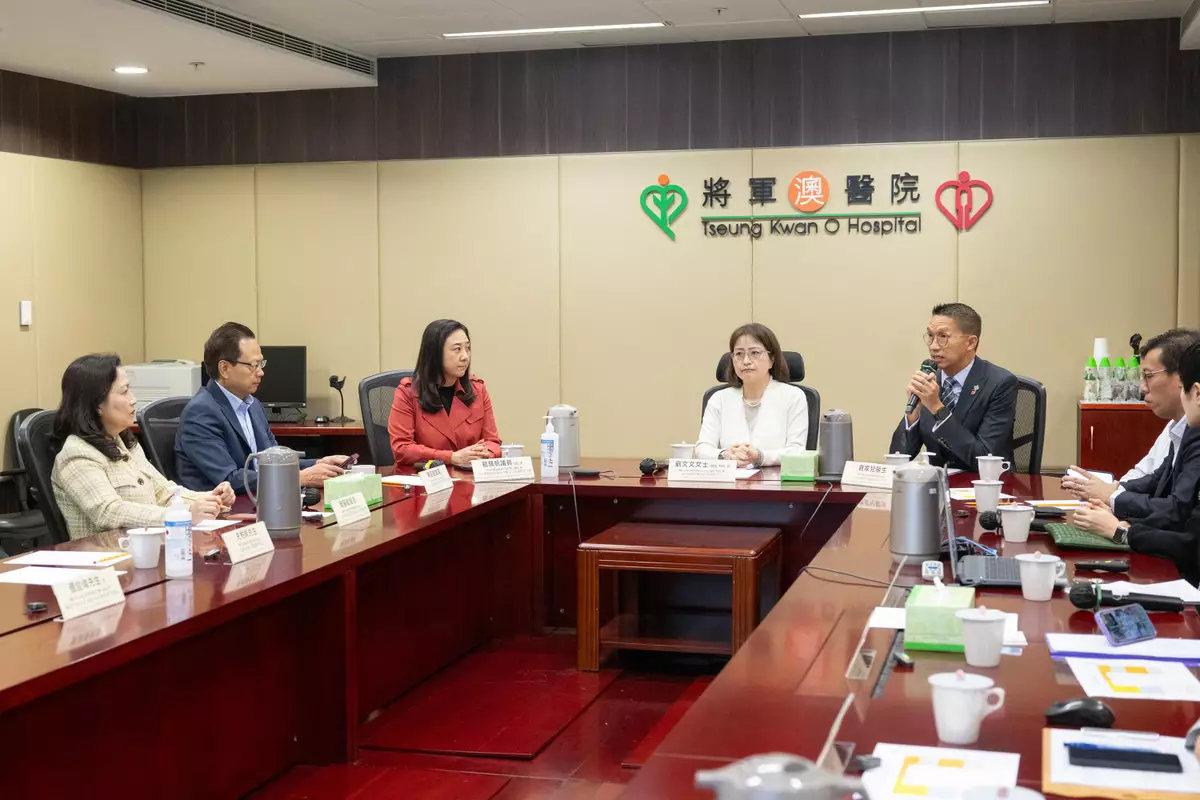
LegCo Subcommittee on Matters Relating to the Development of Smart City visits Tseung Kwan O Hospital Source: HKSAR Government Press Releases








